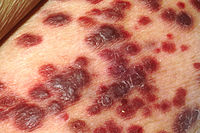
Photo from wikipedia
Recently, Remdesivir and Molnupiravir were approved for treating COVID-19 caused by SARS-CoV-2 infection. However, little is known about the impact of these drugs on other viruses preexisted in COVID-19 patients.… Click to show full abstract
Recently, Remdesivir and Molnupiravir were approved for treating COVID-19 caused by SARS-CoV-2 infection. However, little is known about the impact of these drugs on other viruses preexisted in COVID-19 patients. ABSTRACT Recently, remdesivir and molnupiravir were approved for treating COVID-19 caused by SARS-CoV-2 infection. However, little is known about the impact of these drugs on other viruses preexisted in COVID-19 patients. Here we report that remdesivir but not molnupiravir induced lytic reactivation of Kaposi’s sarcoma-associated herpesvirus (KSHV) and Epstein-Barr virus (EBV), two major oncogenic herpesviruses. Remdesivir induced mature virion production from latently infected cells. Mechanistic studies showed that remdesivir induced KSHV and EBV reactivation by regulating several intracellular signaling pathways.
Journal Title: Antimicrobial Agents and Chemotherapy
Year Published: 2022
Link to full text (if available)
Share on Social Media: Sign Up to like & get
recommendations!